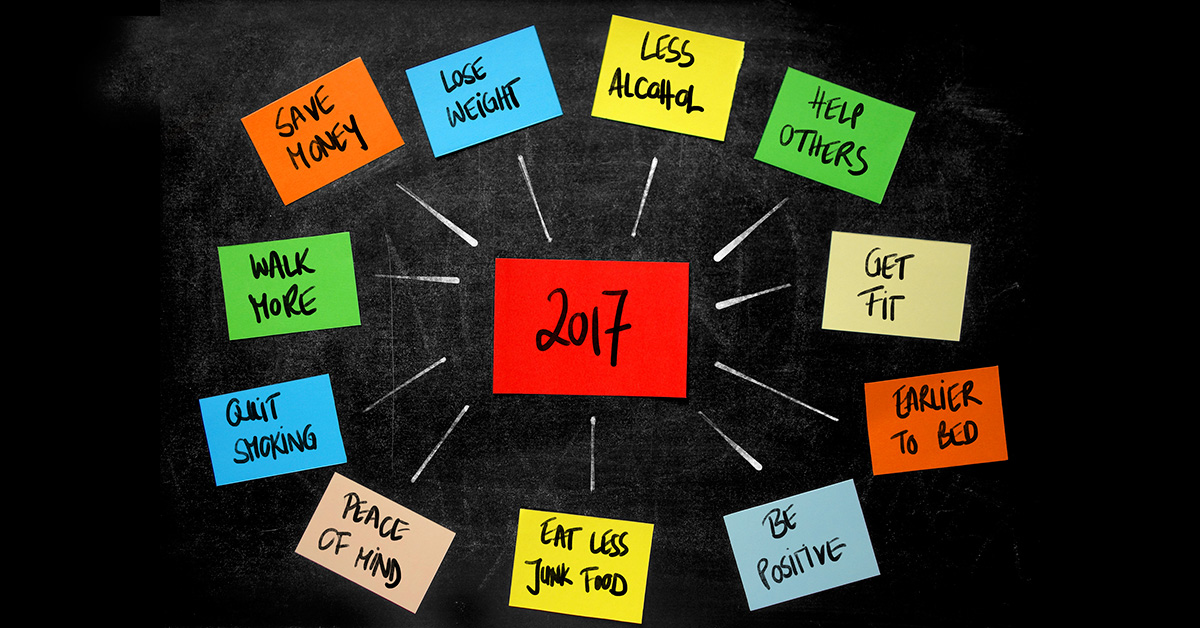Wellness Tips from Bon Appétit: Get S.M.A.R.T. About New Year’s Resolutions
- by bonappetit
 New Year’s resolutions never seem to stick. Is it even worth it to set one?
New Year’s resolutions never seem to stick. Is it even worth it to set one?
The New Year is coming. Can you feel it? A fresh, new year, full of promise, resplendent with opportunity…and rife with anxiety.
Let’s admit it: Many of the resolutions we all set in the New Year are goals we set every year. We vow to be more responsible with money, or to be more committed to work/life balance. We believe we will pick up a new hobby or learn a new skill. And, many of us promise ourselves that this is the year we’ll really “get healthy.” According to a 2015 Nielsen poll, more than one-third of Americans resolve to lose weight or get fit in the New Year. But, just days or maybe weeks after the ball drops, those well-intentioned resolutions are a distant memory for many of us. Don’t trip, potato chip! That doesn’t mean that resolutions are a wasted effort. It may just be that your approach to making resolutions is setting you up for failure. And we can fix that!
Typical resolutions are often lofty, vague, or unattainable. We’re about to drop some hard-won knowledge on you: Studies show that without a specific plan as to how your resolutions will be achieved, your goal will probably fail. (Sorry!) For example, a resolution to “get in shape” is vague, and without a concrete plan it’s hard to achieve. However, resolving to go to a spin class after class or work on Monday, Wednesday, and Friday for the next month is a much more tangible and realistic goal. (You can do it! Seriously!) It also breaks up what might be a longer term goal of feeling physically fit into a smaller, measurable goals. It’s not only more achievable, it’s SMART.
SMART is an acronym for: Specific, Measurable, Achievable (or Attainable), Realistic, and Timely (or Time-Bound). SMART goals work because they bring structure to your resolutions as well as provide a way to honestly track your progress. If your goal is attending a spin class as described above, at the end of the week you can assess how you did and what improvements or changes can be made the next week. When setting SMART goals, consider the following:
- Specific. Ask yourself the following questions: Who is involved? What do I want to achieve? When will I do it? Where will I achieve the goal? Why do I want to set this goal? How will I achieve it? When you are specific with your goals, you may find that you have multiple smaller goals to help address one health need. For example, to lose weight, you may set a food-related goal and one for exercise.
- Measurable. When you look back at the end of the day, can you assess whether you achieved your goal? Eating healthy is not measurable, but eating at least one serving of fruits or vegetables at each lunch and dinner is.
- Achievable. This helps you determine whether a goal is something within your reach given your resources (time, money, etc.). If you work long hours and have young kids at home, training for a marathon may not be achievable for you. But, perhaps waking up 30 minutes early to get in a 3-mile run three to four times per week is.
- Realistic. What is the likelihood of success? Goals should stretch you to improve, but shouldn’t be unrealistic. For example, if your goal is to cook more at home and you currently eat dinner from a restaurant every night of the week, a realistic goal might be to cook at home at least two times per week for the next month.
- Timely. Consider when you will accomplish this goal. This is both related to the time of day you will you complete it (eating a serving of vegetables at lunch) and when you can assess your accomplishment and determine if it’s time to set a new goal (in one month). Setting smaller short-term goals that are part of a larger goal allows you to celebrate achievements more often.
If your resolution is health-related, read more about what it takes to become a “Healthy You” for some inspiration. This year, instead of resolving to lose weight or finally get in shape, consider what it will take you to get there and set yourself up for success. Take a new approach to your resolutions and set SMART goals. You’re worth it.
At Bon Appétit, we know there’s a lot on your plate that you worry about. That’s why we have a team of registered dietitian nutritionists ready to answer your nutrition questions about which food choices will help you avoid unwanted pounds, work or study (and sleep!) better, and form long-lasting healthy eating habits. Email your questions and feedback to [email protected]